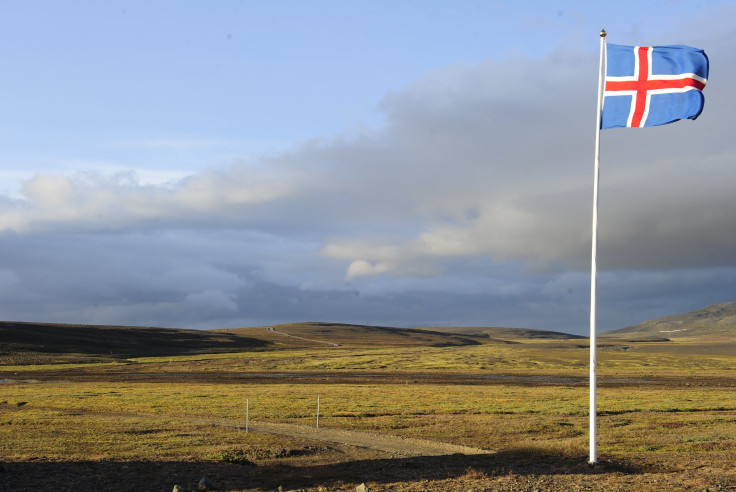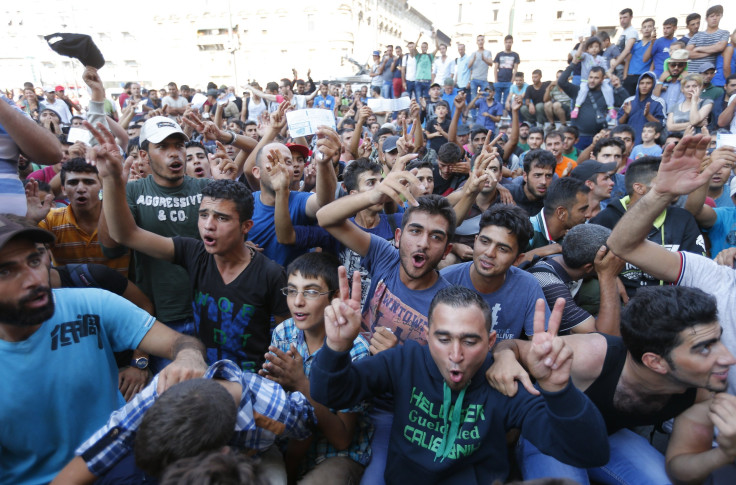'Refugees Are Our Best Friends': In Iceland, Communities Campaign To House Syrians, Ease Europe's Migrant Crisis

Vala Magnusdottir sits in the small apartment she shares with her boyfriend, keeping close watch on her year-old son as he plays with his toys. She scrolls through her newsfeed on Facebook, looking for updates on an event she is attending. The number of people joining this particular virtual event has grown by 3,000 overnight. All 13,000 attendees are committed to helping Syrian refugees find homes, clothes, shelter, food and work. This outpouring of support is all the more extraordinary because it comes from Iceland -- a sparsely populated, isolated island at the juncture of the North Atlantic and Arctic oceans.
"Icelanders grow up staying away from strangers. It is just the culture," Bryndis Bjorgvinsdottir, an Icelandic author and professor, told International Business Times. The movement to help refugees, and allow more into the country, is unprecedented.
Bjorgvinsdottir was inspired to create the Facebook group “Syria Calling” after one of her friends wrote a Facebook post outlining his desire to help Syrian refugees. Bjorgvinsdottir put out a call on Facebook Sunday asking for Icelanders to speak out if they wanted the government to do more to help those fleeing Syria's bloody civil war. More than 12,000 people have offered to take Syrians into their homes, and signed a petition to put pressure on the government after it said only 50 migrants would be accepted this year.
"There was an explosion overnight with this group. Thousands of people wanted to be a part of it," Bjorgvinsdottir said.
Magnusdottir is one of them. The young mother from Keflavik, a small town on the southwestern tip of Iceland, said she doesn't have much, but that won't deter her from sharing what she has.
“It breaks my heart to see what's happening and I know I can help, and I will in any way possible,” Magnusdottir said in an interview with IBTimes. “We don't have a lot of money but we have food on our table and water, we have clothes on our backs and a roof over our heads, and we have each other. Some of these people are watching their children and parents die or suffer. I've started to save money as much as we can afford so I can maybe help someone.”
The campaign is part of a concerted effort to see refugees as people -- as individuals with skills to offer their host countries. In an open letter to Iceland's minister of welfare, Bjorgvinsdottir wrote, "Refugees are our future spouses, best friends, our next soul mate, the drummer in our children’s band, our next colleague, Miss Iceland 2022."
Mohammed al-Kherat, a Syrian refugee from Dera'a living in Jordan, told IBTimes he wishes more European countries would start movements like the one in Iceland. He works as an English tutor in Irbid, Jordan, but does not have enough money to get married and have a family, he said.
"I would prefer to go to Germany or the U.K. rather than Iceland," he said. "But that is not an option. Getting smuggled is dangerous. I have applied for visas to Europe several times but have been denied."
Bjorgvinsdottir said she has not heard any direct response from the government yet, but Icelandic Prime Minister Sigmundur David Gunnlaugsson has agreed to appoint a committee of ministers to discuss the possibility of allowing more refugees into the country.

The Icelanders' efforts come as a direct response to the biggest migration crisis in Europe since World War II. People are fleeing increasingly desperate situations in warring states across the Middle East and North Africa. In July, the number of refugees and migrants in the European Union’s member states reached a record 107,500. Thousands more arrived at EU borders this month.
The journey to Europe from Syria and Iraq starts in Turkey. People either take boats to Greece or make the journey overland to the Balkans and north to countries like Sweden and Germany. Migrants fleeing Africa usually take perilous boat journeys from Libya to Italy.
The crisis reached a low last week when Austrian officials discovered 71 dead migrants in a truck near the border with Hungary. The U.N. Refugee Agency said more than 2,500 people trying to get to Europe this year died or are missing. In April, 900 migrants drowned in a boat that was traveling between Libya and Italy, and last year hundreds more drowned on the same route.
The European Union announced Monday a plan to hold emergency talks Sept. 14 to deal with an escalating humanitarian crisis that's putting pressure on already volatile economies. The influx of migrants has taken a heavy toll on Greece, which is also dealing with an economic crisis.
"The situation of migration phenomena outside and inside the European Union has recently taken unprecedented proportions," said a statement issued by the EU interior ministers Sunday.
The meeting, called by the U.K., France and Germany, will bring together the EU ministers to discuss the possibility of setting up reception centers in Italy and Greece to register new arrivals. British, French and German ministers also want to create a common EU list of “safe countries of origin” that will allow asylum applications to be fast-tracked for specific nationalities.
Germany, which opened up its borders to all Syrians for the first time last week, said it could receive as many as 750,000 refugees this year -- Syrians will no longer have their asylum cases reviewed to determine if they should receive refugee status; they will be let in regardless.
Iceland, despite the fact it is not a member of the European Union, has pledged to help.
“It has been our goal in international politics to be of help in as many areas as possible and this [refugee crisis] is one of the areas where the need is most right now,” the prime minister told Icelandic news site RUV.
Out of a population of 323,000, Iceland has 99 refugees and 210 asylum seekers, the majority Palestinian, according to U.N. estimates.
Magnusdottir and Bjorgvinsdottir said the government could be doing more to help.
“Iceland is one of the richest countries in the world,” Bjorgvinsdottir said. “We have always been behind other European Union countries. They are doing so much better than us with this.” Iceland, which is geographically part of Europe and is a member of the European Economic Area, a membership that allows for the free flow of goods, persons and services, dropped its bid to join the EU earlier this year.
“Iceland’s interests are better served outside the European Union,” the foreign minister said in March.
Geographically isolated from its neighbors, Iceland has historically distanced itself from economic and social problems in Europe. But even Iceland was not exempt from the financial crash of 2008 when the nation's banking system completely broke down. The economy has since rebounded and provides full employment and healthcare to residents. Because of its size, the Icelandic government has not held much sway in the European political scene, but now stands as one of the few countries in Europe whose citizens are encouraging the entry of refugees.
"Of course I'm going to help in any way I can, and I can only hope that we can all stand to gather and help each other because at the end of the day I sure hope someone would do the same for me and my family if something would happen," Magnusdottir said.
People are not just offering their homes, she said, but also clothes, medical supplies, "a hug and to tell them it's going to be all right."
© Copyright IBTimes 2024. All rights reserved.




















